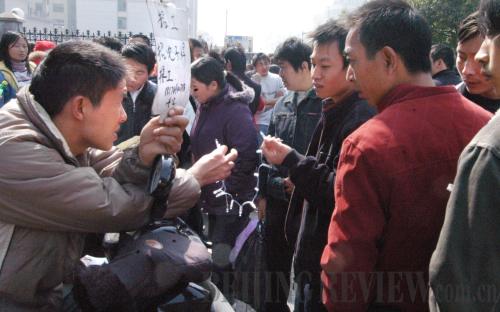|
 |
|
JOB HUNT: Migrant workers search for work at a job fair in Yiwu, a petty commodity hub in east coastal Zhejiang Province on February 21 (TAN JIN) |
A year ago, bosses at some companies in the Pearl River Delta in south China, a hub for export-oriented small and medium-sized enterprises, were forced to cut labor forces due to dwindling orders in the wake of the financial crisis. But as the rapid economic recovery takes hold and orders begin to filter back into the area, employers are having a hard time getting their work force to return as well.
On February 24, 2010, the Department of Human Resources and Social Security of Guangdong Province held a press conference stating Guangzhou, Shenzhen, Dongguan and some other cities in the province were facing a labor shortage of more than 900,000 people, especially in the labor-intensive industries such as electronics and home appliances, toys, shoemaking and hardware. Production at some factories has stopped completely due to labor shortages.
To entice workers, many companies have raised salaries and relaxed recruitment requirements. Even so, some cannot fill their personnel quotas to return to production schedules.
China, with the largest population and most abundant labor force in the world, now faces a near-crippling labor shortage, the reasoning for which has aroused the attention of bosses and scholars alike.
More choices
Li Qiang, Director of the School of Humanities and Social Sciences of Tsinghua University, says China has more than enough workers—the reason for the shortage in the Pearl River Delta is low salaries.
During the past decade, salaries for migrant workers in the coastal areas have not changed significantly, only contributing to the income gap with urban residents, who have seen their salaries increase.
In Guangzhou, the typical pay for a common worker—about 1,300 yuan ($190) a month—is too low for most job hunters. In Li's opinion, if companies continue to offer such low salaries, the difficulty of attracting workers will only intensify. Because migrant workers cannot enjoy the same social welfare and security as urban residents, they expect higher salaries to offset rising living costs in urban areas, especially large and medium-sized cities.
Li thinks there is another reason for the labor shortages in China's coastal areas. With economic development taking place across the country, some companies have moved from the southeast coast to the central and western areas. Labor demands in inland cities such as Chongqing, Wuhan, Nanchang and Chengdu are increasing and migrant workers are more willing to move to these cities because of their proximity to their hometowns, which helps eliminate traveling expenses between home and work. And while salaries are similar to those in the coastal areas, the living costs in interior cities are lower.
In recent years, the country has focused its resources on agriculture, farmers and the countryside in general. Local governments offer various incentives for migrant workers to start their own businesses in their hometowns, and many rural workers have been quick to jump at this opportunity.
"Workers have more choices when hunting for jobs, and developed coastal areas are no longer their only choice for employment," Li said.
Demographic bonus
Since 1978 when the reform and opening-up policy was adopted, China has achieved rapid economic growth, one of the most important reasons for which was the demographic bonus, a rise in economic growth rate due to a prominent working age demographic.
However, demographic bonus isn't unlimited. Current labor shortages will inevitably push up salaries for migrant workers, causing traditional labor-intensive industries to lose their cost advantages.
"China's demographic bonus is declining," said Guo Zhigang, an expert on population from the Department of Sociology at Peking University.
Shortages mainly occur in labor-intensive, export-oriented industries in the coastal regions. Since the net profit rate in these industries is only between 3-5 percent, labor shortages will eat away at already meager profits.
Labor shortages seem to forebode the gradual exhaustion of the demographic bonus as traditional labor-intensive industries and cheap exporting commodities rapidly lose their advantageous labor draw.
However, Zhou Binglin, an analyst at Guosen Securities Co. Ltd., thinks it is still premature to pass such judgments. "The present labor shortages are not completely equal to an exhaustion of the demographic bonus," he said.
A large number of infrastructure projects that were in their planning stages are now being launched, drawing workers inland to aid construction efforts. But with the economic recovery, coastal areas also need more workers, leading to the present labor shortages. This phenomenon won't last long, Zhou said.
China's demographic bonus will last for a long time, Zhou said. From current statistics, the demographic bonus is steady and within the next five to 10 years it will maintain this stable growth until an expected decline in 2025.
| 